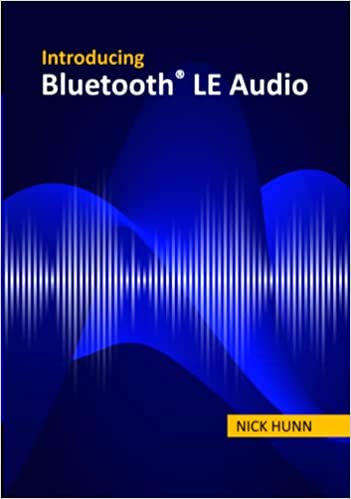Bluetooth® technology now supports Auracast™ broadcast audio, a new capability that enables an audio transmitter to broadcast to an unlimited number of nearby audio receivers. Auracast™ broadcast audio promises to deliver life-changing audio experiences, enhancing the way people engage with others and the world around them.
With its release, the possibilities Auracast™ broadcast audio will enable is creating quite a buzz throughout the industry, and there are questions about the impact this innovation have on the wireless audio market.
Below are answers to some of the commonly asked questions about Auracast™ broadcast audio.
Answers to Commonly Asked Questions
Will cell phones operate as an Auracast™ Transmitter?
Yes. Cell phones can qualify using the Source role from the Public Broadcast Profile (PBP) to enable Auracast™ broadcast audio transmissions from the smartphone. Primarily this will be used in the personal sharing use case mentioned in the presentation.

In case of a private audio broadcast, is there any authentication feature to only allow access to authorized listeners?
The specification does allow for an encrypted broadcast code for private listening.
What types of devices will send out Auracast™ broadcast audio into a room? Dedicated transmitters or built into other devices like WiFi access points?
For public spaces, it will be a central broadcast transmitter. This can take on many forms. It can be a dedicated Auracast™ transmitter, or it can be integrated into other devices, such as a WiFi AP. Auracast™ broadcast audio can even be directly integrated into an audio source like a microphone for live audio events and tour systems. This is up to the innovation of the device and system manufacturers.
Does Auracast™ broadcast audio work with current Bluetooth hardware, or do all devices, both receivers and transmitters, have to be replaced?
The new specifications allow for upgradability of existing products in the field. Whether field upgrades occur will depend on the underlying Bluetooth® capabilities already in a device and the supplier’s product strategy. We do expect some product types will be upgradeable but do not have visibility into specific product strategies.
How can I connect to an Auracast™ broadcast?
There are a number of ways to provide the Auracast™ transmitter info to the Auracast™ receiver via the Auracast™ assistant. The Auracast™ assistant can be an app or it can use an NFC/QR code to capture the broadcast info necessary for the Auracast™ receiver to join. See how it works.
What is the range of an Auracast™ broadcast?
The range of the broadcast depends on the implementation. For example, a single Auracast™ transmitter can reach an area of 30,000 square feet, depending on the transmit power and antenna design.
How is an Auracast™ broadcast encrypted?
Broadcast transmissions can both be private (encrypted) and open (unencrypted). You can set up a passcode, similar to Wi-Fi, to join personal Auracast™ transmitters. For Auracast™ transmitters in public spaces, unencrypted broadcast audio streams are recommended.
Do you see a possibility to create public alerts (in broadcast) that act as push notifications for smart devices like a smartphone? (e.g., to alert flight delay or other specific information)
These are all good use cases for Auracast™ broadcast audio. The example of a flight delay does not need to originate from the smart device. This can originate from an Auracast™ broadcast public address (PA) for the specific gate, as an example.
How can we make sure that no manufacturer will make proprietary variant of Auracast™ broadcast audio?
Auracast™ broadcast audio, by definition and requirements, is universal. A proprietary variant will not carry the Auracast™ name or trademarks. We are working closely with the ecosystem – including Pro AV, hearing aid, consumer source devices (e.g., phone, tablet, PC, and TV), consumer hearing devices, and audio infrastructure suppliers – to ensure wide adoption and deployment of Auracast™ broadcast audio.
How many channels can be used for Auracast™ broadcast audio?
Theoretically, the number is unlimited. However, this may be limited by the resource availability of the hardware. Please consult the individual manufacturer.
![]()
ON-DEMAND WEBINAR
What Product Developers & Public Locations Need to Know About Auracast™ Broadcast Audio
Watch this discussion on how Auracast™ broadcast audio will introduce new opportunities for wireless audio developers and allow public locations to enhance their visitor satisfaction while increasing audio accessibility for all.
Could you please share details about home speaker use cases?
A simple use case for a smart home speaker is to have direct audio to earbuds and hearing aids for alarms, alerts, or when a “Hey Siri..” question is answered. This can significantly benefit those with hearing loss. The same applies for other alerts in the home like doorbells, etc.
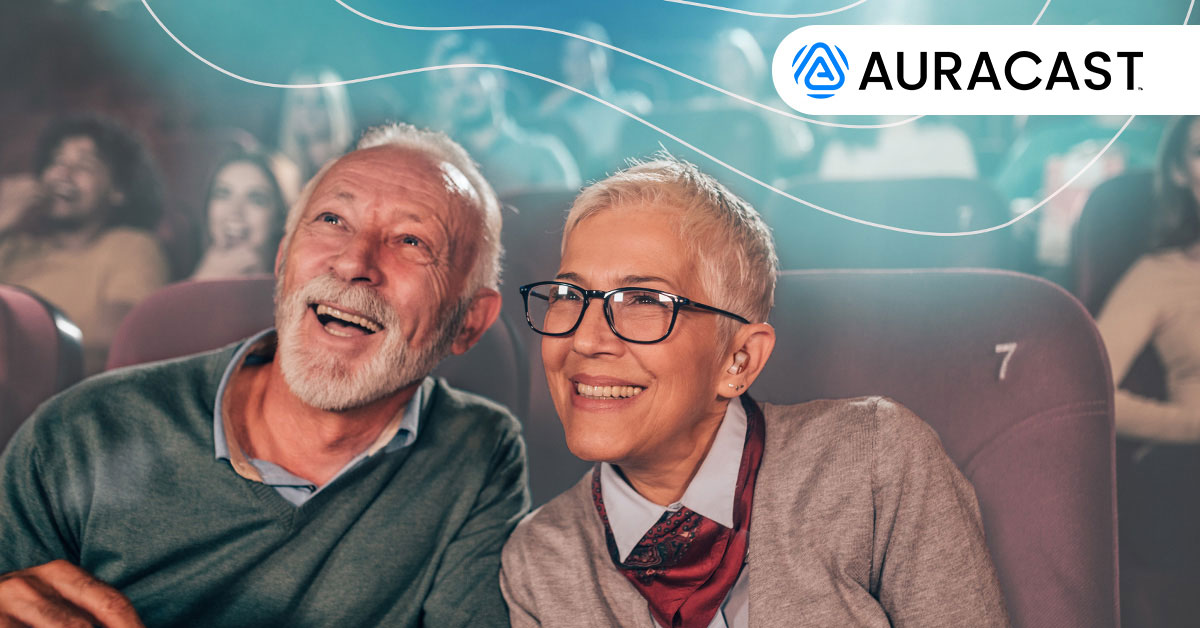
Is the Bluetooth SIG working with the ADA to address ALS hearing requirements for Auracast™ broadcast audio ?
Yes. The Bluetooth SIG is engaging with advocacy organizations like the Hearing Loss Association of America (HLAA) and other key stakeholders on direction and strategies to address ADA and ALS hearing requirements.
Auracast™ broadcast audio looks like a profile on top of Bluetooth LE Audio. Do you foresee Bluetooth LE Audio replacing standard Bluetooth Classic, especially for the audio streaming profile?
Auracast™ broadcast audio is a specific set of requirements that uses the Public Broadcast Profile (PBP) specification for a universal format and availability of a public broadcast. PBP is one of the Bluetooth LE Audio specifications. For Bluetooth LE Audio, along with new use cases like broadcast, it will support all use cases currently supported by Bluetooth® Classic Audio. However, transition and timing will be determined by manufacturer roadmap and consumer demand.
Does an Auracast™ transmitter that is meant for private (home) use have to follow same guidelines as the ones meant for public use?
All devices that carry the Auracast™ brand name will need to follow the requirements in the Brand Guide for Bluetooth Trademarks. We believe it is important that the home transmitter and the public transmitter follow the same Auracast™ requirements. This way, consumers are assured they can listen to both public and private Auracast™ broadcasts from their same receiver devices.
Hearing aid accessories that convert Auracast™ broadcast audio into a neck loop can give users with older hearing aids access to the Auracast™ broadcast audio. Hopefully, someone will develop this.
Yes. We believe this to be an Auracast™ product type that should be available in the market. Availability will be driven by consumer demand.
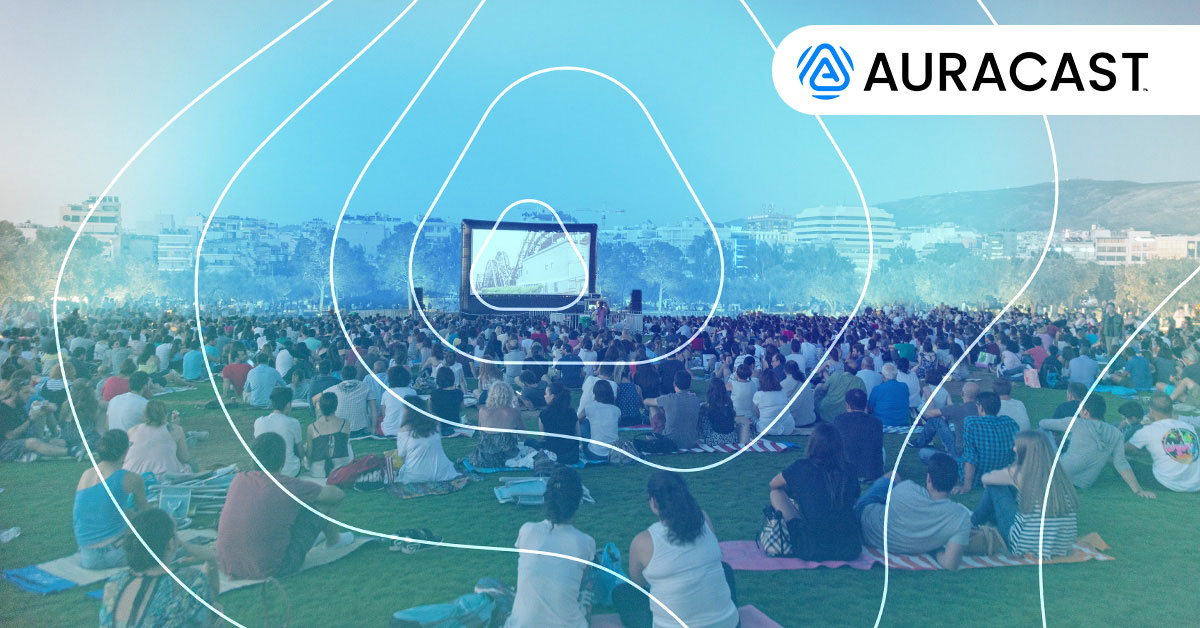
Is Auracast™ broadcast audio mandatory for a Bluetooth LE Audio-compatible device?
No. Auracast™ broadcast audio is an optional capability and brand. However, we encourage all source and sink devices to support Auracast™ broadcast audio to ensure the widest set of capabilities for consumer devices.
Are there plans for television manufacturers to build in Bluetooth LE Audio?
It is our understanding that TV manufacturers are implementing Bluetooth LE Audio and Auracast™ broadcast audio into their products and solutions.
What is the practical coverage area of Auracast™ broadcast audio in public space, such as an airport gate?
There are many factors that determine coverage, including location architecture, antennae design, location and output power of the transmitter, and others. With a centrally located, high-output power transmitter, it is anticipated that coverage will be far more than what you may experience normally with personal source and sink devices (e.g., smartphone and headphones).
What is the main difference between Bluetooth LE Audio and Auracast™ broadcast audio?
Bluetooth LE Audio is the underlying Bluetooth® audio architecture for the LE radio. Bluetooth LE Audio contains specifications for using broadcast audio. Auracast™ broadcast audio is a specific and unified implementation of broadcast audio for personal audio sharing and broadcasting audio in public spaces. Following both the Bluetooth LE Audio specification and the Auracast™ requirements ensures all Auracast™ transmitters and receivers will interoperate together, globally.
![]()
MARKET RESEARCH
LE Audio: The Future of Bluetooth® Audio
Get new forecasts about when and which audio devices will adopt Auracast™ broadcast audio, along with predictions for when public locations will deploy this new Bluetooth capability to enable new audio use cases in their venues.
Are test houses ready to get first Auracast™ designs certified?
Test house are prepared to test and qualify for Bluetooth LE Audio. Auracast™ requirements are contained in the Brand Guide for Bluetooth Trademarks. Any test house should be able to verify your implementation meets the Auracast™ broadcast audio requirements.
As someone considering new assistive listening technology deployment in their location today, say within six months, would you recommend Auracast™ broadcast audio as an option?
Yes. Currently, depending on your use case, we recommend you consider Auracast™ broadcast audio along with other ALS systems to ensure the broadest availability of ALS technology to the user. Several assistive listening system providers are developing Auracast™ transmitters and systems along with existing technology.
In big public areas, would it be needed to also indicate where the broadcaster is located to avoid the user moving too far away and lose quality/audio?
Helping the user understand the intended coverage area is important. Depending on the size, location, and architecture of the public space, the intended coverage area can vary. It is recommended you test the intended coverage area to maximize your deployment.
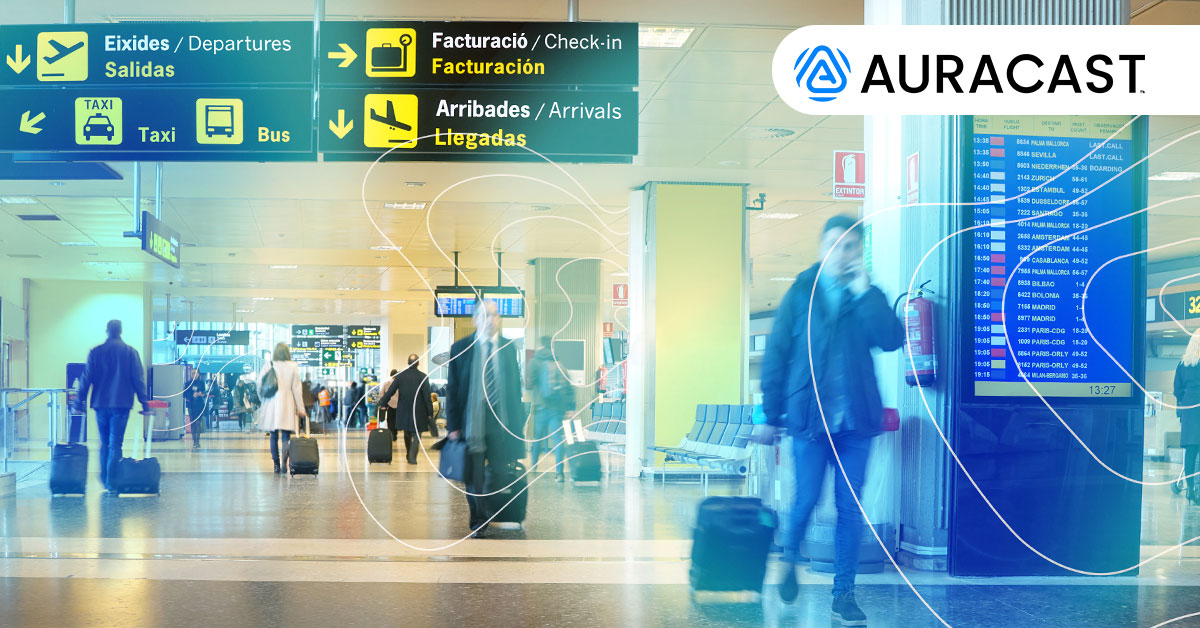
Any estimate when Auracast™ broadcast audio may be available on Android or iOS?
Android has already announced its support for Bluetooth LE Audio in Android 13. Apple has yet to make a public announcement.
Is Auracast™ broadcast audio part of the operating system or will it be a third-party app?
We anticipate settings and configuration for Auracast™ broadcast audio will be integrated into the OS user experience, similar to WiFi and Bluetooth® technology today. Applications may also take advantage, depending on the developer APIs exposed by the OS.
Are there any expectations around when we will start seeing Bluetooth LE Audio features, including Auracast™ broadcast audio, BASS, etc., become readily available to the public in mobile devices and other CE devices?
We anticipate the availability of Bluetooth LE Audio and Auracast™ broadcast audio devices will ramp up in early 2023.
Would venues like schools, auditoriums, and theaters that could not afford technologies like T-coils find Auracast™ broadcast audio more economical?
It is our belief that the implementation of an Auracast™ system can greatly simplify installation and support for assistive listening. This will depend on the implementation. We recommend consulting an ALS system provider and installer for more detail.
Can an earbud support Bluetooth Classic (for streaming and phone calls) and Auracast™ broadcast audio only for broadcast reception?
Yes. This will be dependent on the manufacturer’s implementation and capabilities.
How does multi-language work? Do you broadcast multiple audio streams in each language?
Yes. Each language would be a separate broadcast stream that can be identified by an Auracast™ assistant or the receiving device.
Theoretically, there is no restriction to the number of streams or the number of transmitters that can be supported at a location. There may be resource limitations on the transmitter itself. However, that does not preclude another transmitter from broadcasting additional audio streams at the location.
Can Auracast™ broadcast audio share not only for audio but video in the future?
Today, Auracast™ broadcast audio is focused on broadcasting the audio from a video, not the video itself.
Can we control the overspill when using Auracast™ broadcast audio as a one-to-one counter system so others nearby cannot listen in?
Auracast™ broadcast audio is capable of using broadcast codes for secure conversations. Managing output power and spillover alone does not guarantee privacy. The use of broadcast codes is recommended for private access.
Can Bluetooth technology and Auracast™ broadcast audio work at the same time?
Yes. Auracast™ broadcast audio is a Bluetooth® technology. Auracast™ broadcast audio will work alongside traditional Bluetooth use cases.
To learn more, check out these great Auracast™ resources.

FEATURED INNOVATION
Auracast™ Broadcast Audio
Auracast™ broadcast audio will deliver life-changing audio experiences that will enhance the way you engage with others and the world around you.
Bluetooth®︎技術に新たに加わったAuracast™ ブロードキャスト オーディオは、送信機から受信範囲内にある台数無制限の受信機へのオーディオブロードキャスト配信を可能にする新機能です。AuracastTM ブロードキャスト オーディオは画期的なオーディオ体験をもたらし、周囲の人や場所との豊かな関わりを実現します。
AuracastTM ブロードキャスト オーディオの公開とともに、この新機能によって開かれる新たな可能性に大きな注目が集まっています。業界からは、この革新的な技術がワイヤレスオーディオ市場にもたらす影響について知りたいという声が多く寄せられました。
以下、AuracastTM ブロードキャスト オーディオについて、多く寄せられている質問への回答を掲載します。
よくある質問への回答
携帯電話はAuracastTMの送信機として使えるようになりますか。
はい。携帯電話にPBP(Public Broadcast Profile)のSourceというロールを持たせることにより、スマートフォンからのAuracastTM ブロードキャスト オーディオ配信が可能になります。これは主に個人的なオーディオ共有の際に使用されます。

個人がオーディオブロードキャストを行う場合、承認された視聴者にのみアクセスを許可するための認証機能はありますか。
仕様上、個人の視聴用途での暗号化ブロードキャスト配信コードの使用が可能です。
AuracastTM ブロードキャスト オーディオから屋内向け配信を行う場合、どのようなデバイスの使用が想定されますか。専用の送信機、もしくはWiFiアクセスポイントといったデバイスに組み込まれたものになるでしょうか。
公共の場では配信用のセントラル送信機を使用します。これにはさまざまな形態が考えられ、専用のAuracastTMトランスミッターはもちろん、WiFiアクセスポイントのような他の機器への内蔵も可能です。さらにAuracastTM ブロードキャスト オーディオは、ライブイベントやツアー用システムで使用するマイクのような音源となる機器に直接組み込むこともできます。このように、機器やシステムを開発するメーカーにはさまざまなイノベーションの余地があります。
AuracastTM ブロードキャスト オーディオは既存のBluetooth対応ハードウェアでも利用できますか。それとも送信機・受信機を含めたすべての機器を新しく用意する必要がありますか。
新仕様では既存製品の関連領域におけるアップグレードが可能ですが、実際にアップグレードされるかどうかは、そのデバイスに搭載されているBluetooth®︎の機能と、メーカーの製品戦略によります。製品種別の一部についてはアップグレード可能になるとの予測を持っていますが、具体的な個々の製品戦略については把握していません。
AuracastTMによるブロードキャスト配信に接続する方法を教えてください。
AuracastTM トランスミッターの情報をAuracastTM アシスタント経由でAuracastTM レシーバーに届けるには、いくつかの方法があります。AuracastTM アシスタントはアプリにすることも可能ですし、NFCまたはQRコードを使用してAuracastTM レシーバーが参加するために必要な配信情報を取り込むこともできます。仕組みに関する詳細はこちらをご覧ください。
AuracastTMによるブロードキャスト配信の受信範囲はどの程度になりますか。
ブロードキャスト配信の受信範囲は実装の具体的仕様によってそれぞれ異なります。AuracastTM トランスミッターによる配信が届く範囲は、送信出力とアンテナの設計により、3万平方フィート(約2787平方メートル)を超える場合も考えられます。
AuracastTMによるブロードキャスト配信はどのように暗号化されますか。
ブロードキャスト配信は暗号化してプライベート設定することも、暗号化せずオープン設定にすることも可能です。WiFiと同様に、プライベート設定のAuracastTM トランスミッターによる配信に参加するためのパスコード設定も可能です。公共の場でのAuracast™トランスミッターの使用に関しては、暗号化なしでのオーディオストリーム配信が推奨されます。
スマートフォンなどのスマートデバイス向けプッシュ通知のような、不特定多数向けのアラート通知が(ブロードキャスト配信において)生成される可能性はあるでしょうか(例:フライトの遅延やその他の特定の情報を知らせるため)。
これはまさしくAuracastTM ブロードキャスト オーディオのユースケースの好例です。フライト遅延の場合、スマートデバイスからの発信である必要はありません。例えば特定の搭乗ゲートのAuracastTM ブロードキャスト オーディオ対応放送設備(PA)システムによる発信が考えられます。
メーカーによる独自のAuracastTM ブロードキャスト オーディオの類似機能開発に関して、それが絶対にないという保証はあるのでしょうか。
AuracastTM ブロードキャスト オーディオは、その定義および要件の両方においてユニバーサルな機能であり、どこにでも実装と使用が可能です。メーカー独自の類似品はAuracastTM の名称や商標を使用できません。Bluetooth SIGではAuracast™が展開されるエコシステムと密に連携し、Auracast™ブロードキャストオーディオの幅広い採用と普及に取り組んでいます。それらのエコシステムは、プロ向けAV機器、補聴器、消費者向け音源機器(スマートフォン、タブレット、パソコン、テレビなど)、イヤホンなどの消費者向け聴取機器、オーディオインフラなどの各種メーカーに及びます。
AuracastTM ブロードキャスト オーディオで使用できるチャンネル数はどの程度になりますか。
理論上は無限ですが、ハードウェア上で使用可能なリソースによる制約が考えられます。個々のメーカーにお問い合わせください。
ホームスピーカーのユースケースについて詳細を教えてください。
スマートホームスピーカーのシンプルなユースケースとして、アラームやアラート、音声アシスタントによる回答の音声などを、イヤホンや補聴器で直接聞く利用法があります。特に難聴者の方々にとっての利便性は非常に大きいでしょう。玄関の呼び鈴など他の通知音にも適用できます。

Bluetooth SIGはADA(障害を持つアメリカ人法)やALS(聴覚補助システム)に関するAuracastTM ブロードキャスト オーディオの要件整理についてHLAA(米国難聴者協会)と協力していますか。
はい。Bluetooth SIGは、ADAやALSの要件に対応するための方向性や戦略について、HLAAなどの権利擁護団体をはじめとする主要な関係者各位と連携しています。
AuracastTM ブロードキャスト オーディオは、LE Audioに依拠する一プロファイルに見えます。特にオーディオストリーミングのプロファイルに関して、将来的にLE Audioが標準的なBluetooth Classicに取って代わるとの予測でしょうか。
AuracastTM ブロードキャスト オーディオは特定の要件の集合体であり、PBP(Public Broadcast Profile)を使用して、普遍的なフォーマットおよびブロードキャスト配信機能を実現しています。PBPはLE Audioの仕様の一つです。LE Audioは、ブロードキャスト配信のような新しいユースケースとともに、現在Bluetooth® Classic Audioが実現しているすユースケースのすべてに対応します。ただしClassic AudioからLE Audioに移行するかどうか、またその時期については、メーカーごとのロードマップと消費者からの需要に基づいて決まっていくでしょう。
個人(家庭)向けのAuracastTM トランスミッターは、公共の場向けと同じガイドラインに従う必要があるのでしょうか。
AuracastTM のブランド名を掲げるデバイスはすべてBluetoothの商標に関するブランドガイドに従う必要があります。家庭用のトランスミッター、そして公共の場で使用されるトランスミッター、そのいずれもが同じAuracastTM の要件に従うことが重要です。それにより一般消費者は、公共の場・個人向けのAuracastTMブロードキャスト配信をいずれも同じ受信用デバイスで確実に受信できるようになるのです。
AuracastTM ブロードキャスト オーディオをネックループで受信できるよう変換する聴覚補助アクセサリー機器があれば、旧式補聴器のユーザーでもAuracastTM ブロードキャスト オーディオを利用できます。そうした開発が行われる見込みはあるでしょうか。
はい。私たちもそうした種類のAuracastTM 製品が市場にあるべきだと考えています。実際に発売されるかどうかは、消費者からの需要が原動力となるでしょう。

AuracastTM ブロードキャスト オーディオ対応は、Bluetooth LE Audio対応デバイスに必須でしょうか。
いいえ。AuracastTM ブロードキャスト オーディオはオプションの機能でありブランドです。ただしBluetooth SIGでは、一般消費者向けデバイスが最大限幅広い機能を確実に提供できるよう、ソースデバイスとシンクデバイスのすべてをAuracastTM ブロードキャスト オーディオ対応とすることを推奨しています。
テレビメーカーによるテレビへのLE Audio搭載の計画はありますか。
製品・ソリューションへのLE AudioおよびAuracastTM ブロードキャスト オーディオ搭載を実施しているテレビメーカーはあると理解しています。
空港の搭乗ゲートなど公共の場におけるAuracastTM ブロードキャスト オーディオの実際的な配信範囲はどの程度でしょうか。
配信範囲を決定づける要素は数多くあり、設置場所の建物構造、アンテナの設計、トランスミッターの設置場所と出力など多岐にわたります。中央に設置された高出力トランスミッターの場合、通常の個人用ソースデバイスとシンクデバイス(スマートフォンとヘッドホンなど)で想定されるよりも、はるかに広い配信範囲が実現する見込みです。
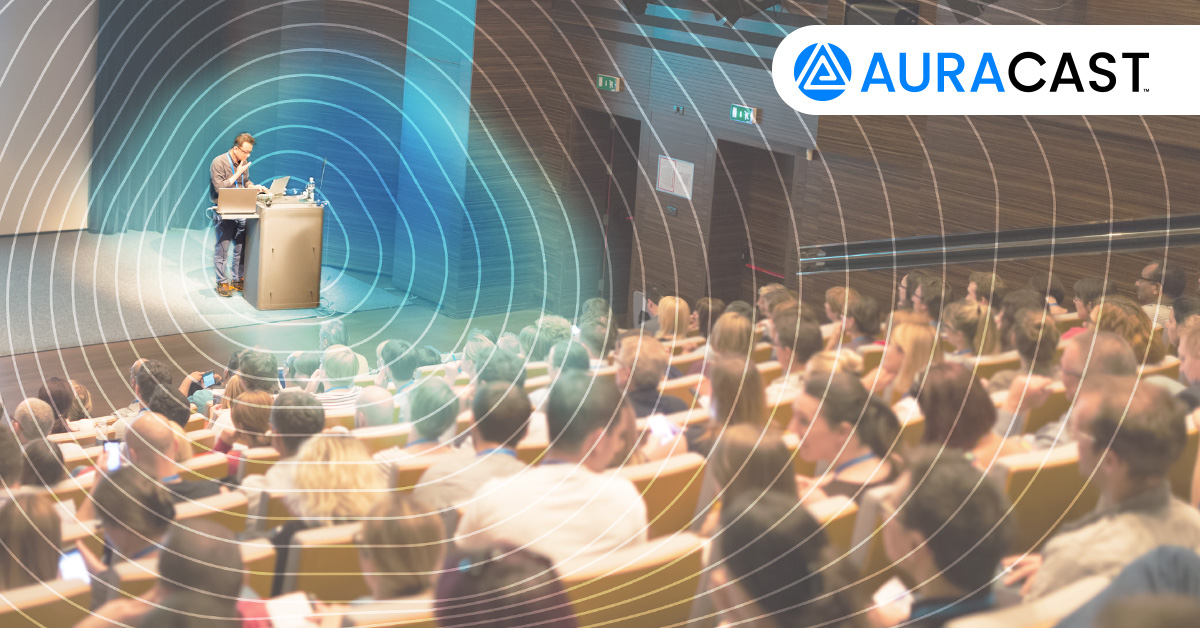
LE AudioとAuracastTM ブロードキャスト オーディオの主な違いとはどのような点でしょうか。
LE AudioはLE無線通信におけるBluetooth®︎のオーディオアーキテクチャであり、その中にブロードキャストオーディオを使用するための仕様が含まれています。AuracastTM ブロードキャスト オーディオは特定かつ統一的な実装として、個人によるオーディオ共有と公共の場でのオーディオブロードキャスト配信を可能にします。LE Audioの仕様とAuracastTM の要件をいずれも満たすことにより、世界中のすべてのAuracastTMトランスミッターおよびレシーバーが相互運用性を持つことが保証されます。
テストハウスではAuracastTM の設計認証開始のための準備が整っているのでしょうか。
テストハウスではLE Audio向けのテストと認証を行う用意ができています。AuracastTM に関する要件はBluetoothの商標登録に関するブランドガイドに記載されています。どのテストハウスも、御社による実装がAuracastTM ブロードキャスト オーディオの要件に適合しているかを確認できるはずです。
半年以内に新しい聴覚補助技術の導入を検討している事業者がいる場合、AuracastTM ブロードキャスト オーディオは推奨し得る選択肢の一つでしょうか。
はい。現在、ユースケースにもよりますが、他のALSシステムと並行してAuracastTM ブロードキャスト オーディオの使用を検討し、ALS技術における最大限幅広い選択肢をユーザーに提供するようお勧めしています。いくつかの聴覚補助システムプロバイダーでは、既存技術とともにAuracastTM トランスミッターおよびシステムの開発を進めています。
大きな公共区画の場合に、利用者が遠く離れすぎることによる音質低下や受信不能を避けるため配信元の場所を示す必要はありますか。
利用者が有効な配信範囲を理解するための支援は重要です。公共の場の規模、場所、建物構造に応じて、有効な配信範囲は変わってくる可能性があります。実装効果を最大化するために、有効な配信範囲をテストすることが推奨されます。
AuracastTM ブロードキャスト オーディオがAndroidやiOSで利用できるようになるのはいつ頃になると見られますか。
Androidに関してはAndroid 13におけるLE Audio対応が既に発表されています。Appleからはまだ公表されていません。
AuracastTM ブロードキャスト オーディオはOSの一部になるのでしょうか。もしくはサードパーティーアプリの位置付けになるのでしょうか。
AuracastTM ブロードキャスト オーディオの設定および構成は、現在のWiFiやBluetooth®︎と同様、OSのユーザー向け機能として組み込まれるものと考えています。また、OSが公開する開発者向けAPIによって、アプリでの活用も可能です。
AuracastTM ブロードキャスト オーディオやBASSをはじめとするLE Audioの機能が、モバイルデバイスやその他の家庭用電子機器で一般的に見られるようになるのはいつ頃か、予測されていますか。
2023年の早い時期から、市場で提供されるLE AudioおよびAuracastTM ブロードキャスト オーディオ搭載機器が増加すると見込んでいます。
テレコイルのような技術の導入が金額的に難しい学校、講堂、劇場などの施設にとって、AuracastTM ブロードキャスト オーディオはより経済的な選択肢となり得るでしょうか。
Auracast™システムは聴覚補助設備の導入と対応を大幅に簡素化できると考えています。具体的には個別の設置状況によって異なりますので、詳しくはALSシステムプロバイダー、設置事業者へのお問い合わせをお勧めします。
ひと組のイヤホンで、ストリーミングと通話にはBluetooth Classicを使用し、AuracastTM ブロードキャスト オーディオはブロードキャスト配信の受信のみに使用することはできますか。
はい。具体的にはメーカーがどのように実装し、どのような機能を持たせるかによって異なります。
多言語対応はどのように実現されるのでしょうか。複数のオーディオストリームをそれぞれの言語でブロードキャスト配信するのでしょうか。

言語ごとに個別のブロードキャスト配信用ストリームが用意され、AuracastTMアシスタントまたは受信デバイスで認識されることになります。
一つの場所で配信できるストリームの数はどの程度でしょうか。上限はありますか。
理論上は、一つの場所で配信できるストリームの数、もしくは使用できるトランスミッターの数には、いずれも上限がありません。トランスミッター自体のリソースに由来する制約はあり得ます。その場合でも、同じ場所に別のトランスミッターを追加し、配信するオーディオストリームを増やすことは可能です。
将来的にAuracastTM ブロードキャスト オーディオでオーディオのみならず動画も共有できるようになりますか。
現在AuracastTM ブロードキャスト オーディオは動画そのものではなく、動画の音声のブロードキャスト配信に特化しています。
窓口での1対1の会話にAuracastTM ブロードキャスト オーディオを使用する場合、付近の無関係な人たちによる会話の盗み聞きを避けるための音漏れコントロールは可能でしょうか。
AuracastTM ブロードキャスト オーディオでは、ブロードキャストコードを使用することにより、会話にセキュリティをかけることができます。出力と音漏れを管理するだけではプライバシーの保証にはなりません。プライバシーが保護されたアクセスの実現には、ブロードキャストコードの使用が推奨されます。
Bluetooth技術とAuracastTM ブロードキャスト オーディオは同時に使用できますか。
はい。AuracastTM ブロードキャスト オーディオはBluetooth®技術の一つです。AuracastTM ブロードキャスト オーディオは従来のBluetoothのユースケースとの併用が可能です。
さらなる情報は、AuracastTMに関する各種資料で詳細をご覧いただけます。


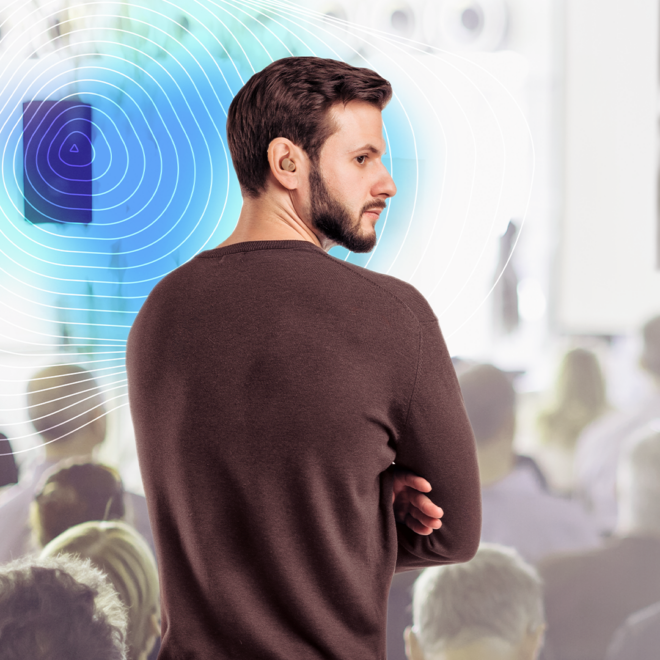




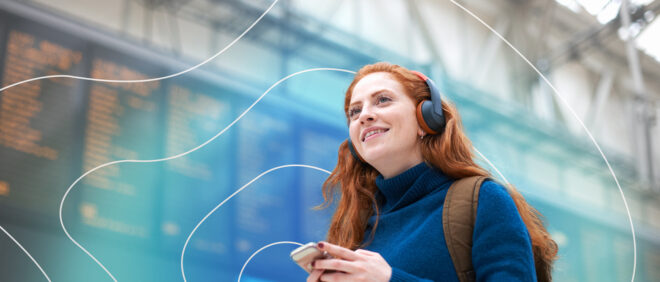
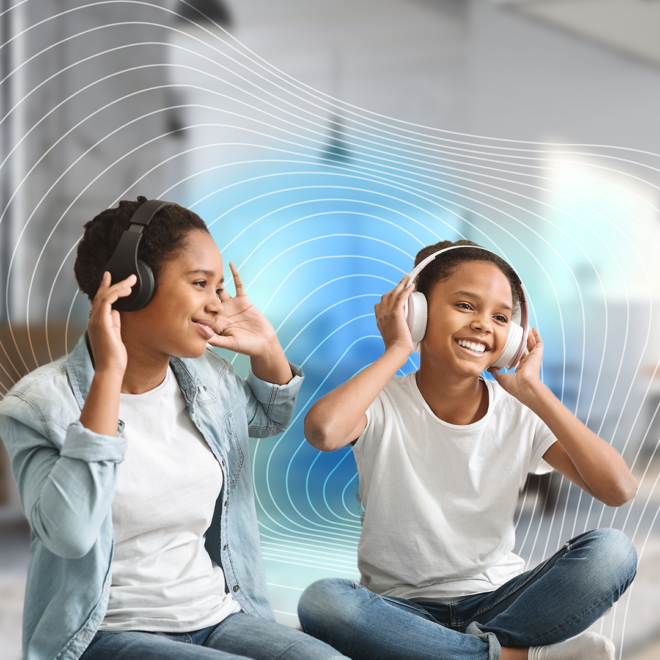
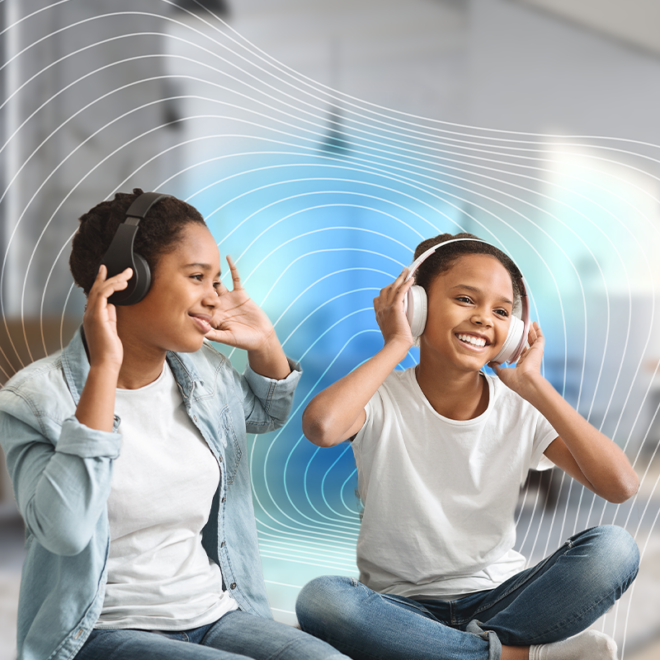

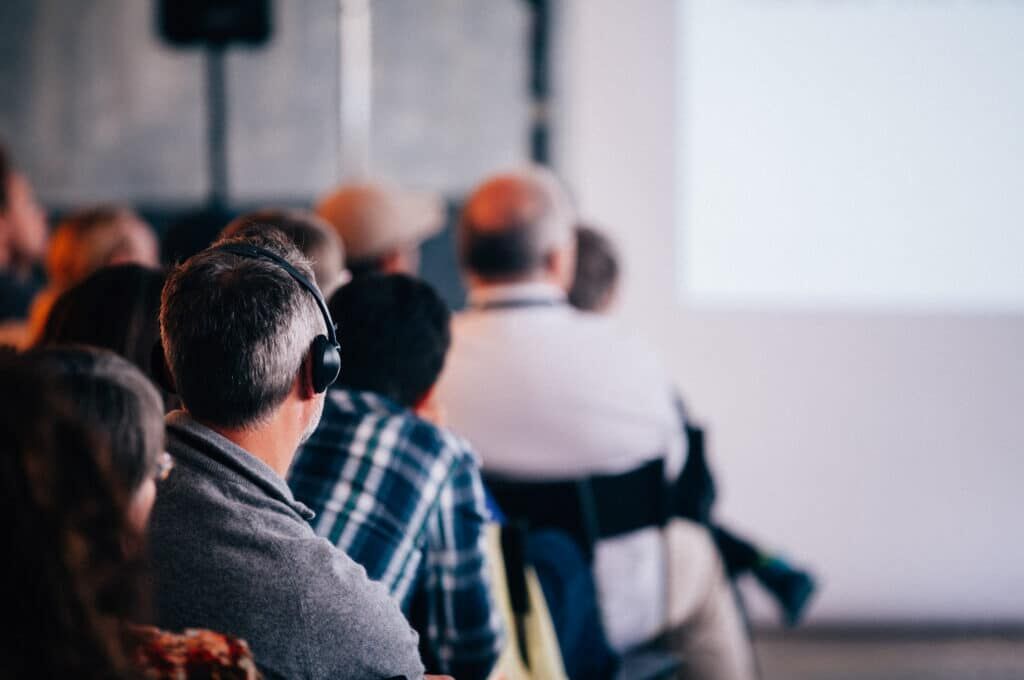
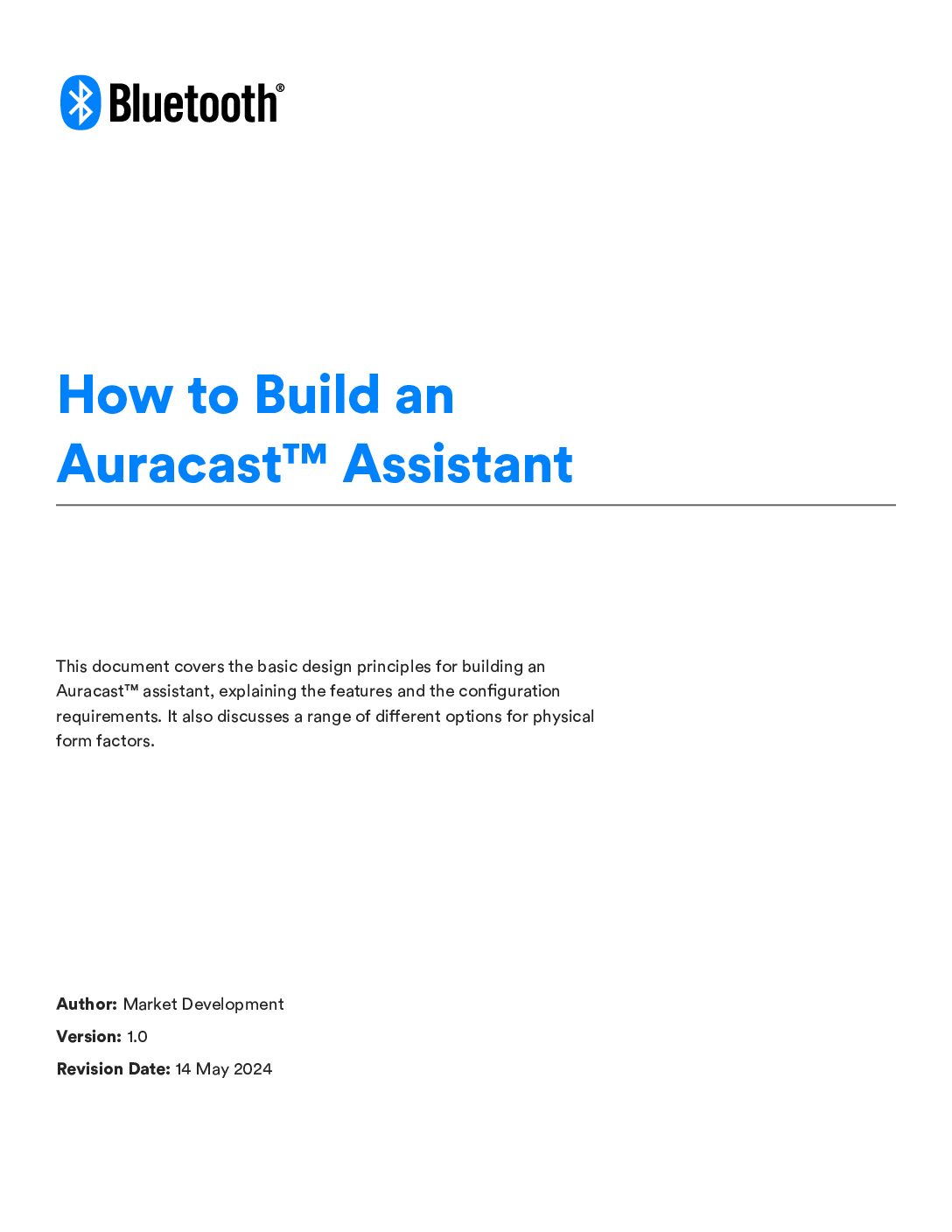
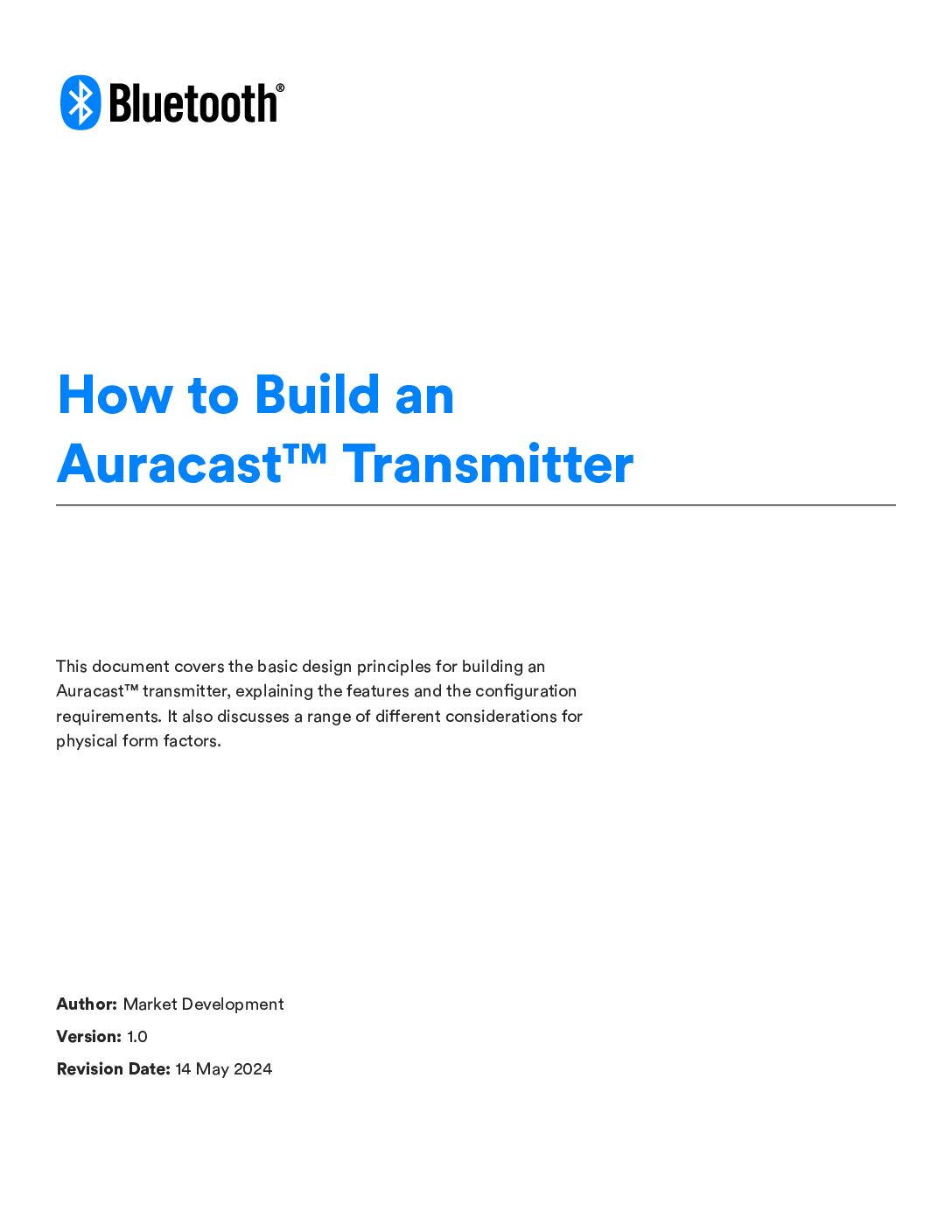
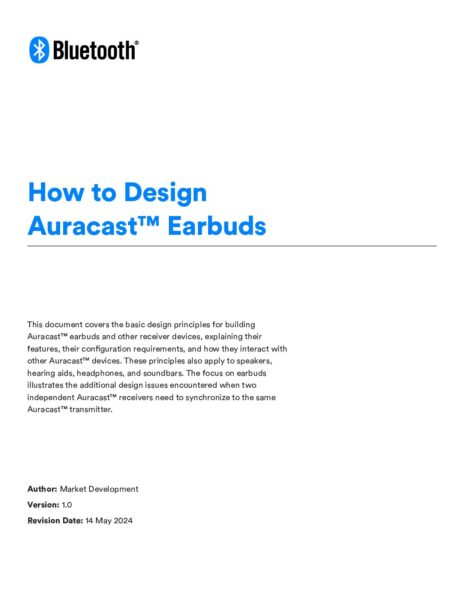

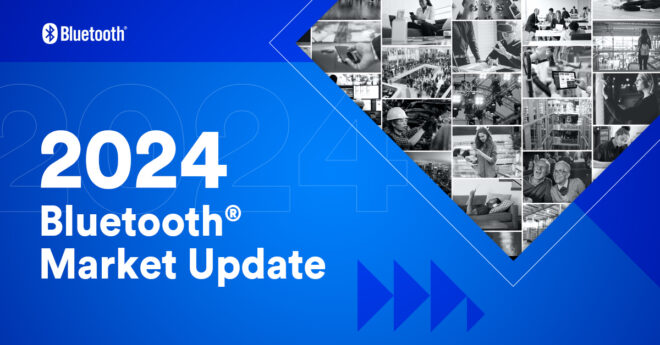
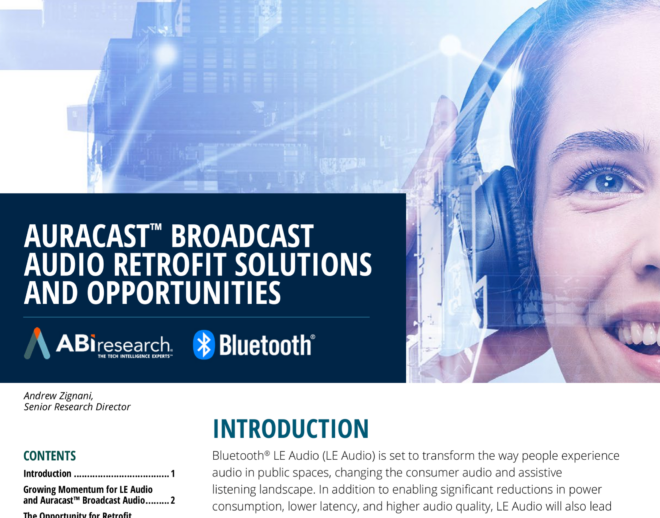
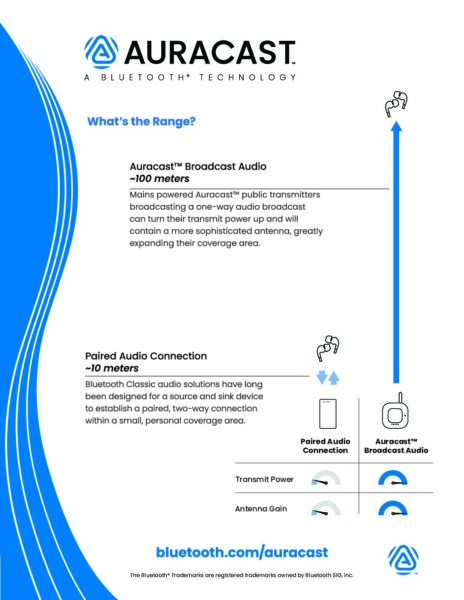
![2312 CES Handout Images FINAL existing pdf 464x600[1]](https://www.bluetooth.com/wp-content/uploads/2024/01/2312_CES_Handout-Images_FINAL-existing-pdf-464x6001-1.jpg)

